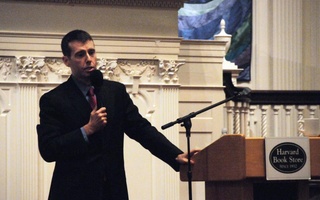President Obama may be smart and honest, but he’s also indecisive, controlling, weak-principled, and, frankly, a bit paranoid. At least that’s what former Defense Secretary Leon Panetta—and much of the nation’s top military brass—would have us believe.
In a memoir released last week, titled “Worthy Fights,” Panetta criticizes the commander-in-chief for flip-flopping on Syria—imposing a “red line” on the use of chemical weapons by President Bashar al-Assad, then backing down when the dictator dropped chlorine on his own people. He blames the rise of the Islamic State on Obama’s failure to convince Iraqi Prime Minister Nouri al-Maliki to allow a residual American military force to remain in the country. He feels betrayed by the president’s reluctance to defend the Pentagon from across-the-board budget cuts imposed by Congress.
Panetta also gripes about being cut out of important decisions, such as Obama’s release of documens about waterboarding under the Bush administration. And though Panetta lauds the president’s intellect, he contends that Obama lacks a certain red-blooded chutzpah that worthy leaders possess.
“Too often,” Panetta writes, “the president relies on the logic of a law professor rather than the passion of a leader.”
Panetta, of course, is not alone in writing a critical inside memoir of the Obama administration. He follows in the footsteps of Robert Gates, Obama’s first secretary of defense, who leveled similar—though even more pointed—criticisms at the president in his January 2014 tell-all titled “Duty.”
In that memoir, the elder statesman laments Obama’s distrust of top military leaders, from former CIA director David Petraeus to former Joint Chiefs Chairman Mike Mullen.
Gates dresses Obama down for his supposed ambivalence toward the war in Afghanistan, which the president doubted was winnable, and for that absence of gusto which Panetta observed.
Interestingly, that last bit—that lack of chutzpah and red-bloodedness, lamented by both works—is a relatively common complaint, even outside the military, as commentators everywhere are demanding Obama be more a firebrand than a professor.
Take David Brooks, the New York Times’ dangerously suave neoconservative, who recently wrote that President Obama is a pragmatist—a kind of law school intellectual logician. But apparently that’s a bad thing.
“Pragmatists…have trouble rousing themselves to action,” he writes. “They try to get rid of emotions when making decisions because emotions might lead them astray. But, in making themselves passionless, they always make themselves tepid and anesthetized.”
Only those with impulsive “literary sensibilities” will “react with a heart brimming with moral emotion,” he writes.
Earlier, Charles Krauthammer lambasted the president for failing to “rally the nation” around a “cause.”
These words weren’t aberrations. Critiques of the restrained Obama Doctrine often rely on abstract concepts—like leadership, toughness, and passion—with policy disagreements sometimes thrown in for good measure
But haven’t we had enough policies based on passion and toughness and overblown anger and patriotism? Shouldn’t the path of our nation be laid out by well-educated persons who think logically about policy decisions, rather than by World War I-redux, war sentimentalists à la Cheney or Rumsfeld? I mean, haven’t we learned anything over the past decade?
A little over 10 years ago, Thomas Friedman, another Times neocon, said to Charlie Rose that the purpose of the Iraq War was to say “Suck. On. This.” to Muslims in the Middle East. No thought there. I don’t even know what “This” is. Just passion. Perfect!
Read more in Opinion
Hillel's Already OpenRecommended Articles
-
DISSENT: Presidential Power“The question we have to ask is who has done the most in the previous year to enhance peace in ...
-
 Plouffe Promotes Book On Campaign Strategy
Plouffe Promotes Book On Campaign Strategy -
Liberty or MadnessThe tenth anniversary of the events of September 11th, 2001 left me, like all Americans, deeply unsettled.
-
 Five People Chris Brown Is Most Likely To Fight With Next
Five People Chris Brown Is Most Likely To Fight With Next -
Lafayette, We Are Here!It is important to note, the admission of women to the frontline comes a little late. The term “front line” is somewhat past its prime, and women have already been fighting on it for many years.
-
Bush-Cheney '04In order to call attention to the fact that the election of progressive hero Barack Obama has yielded two more terms for the iniquities of his Republican predecessors, I decided to affix a Bush-Cheney ’04 campaign sticker to the front of my laptop.













